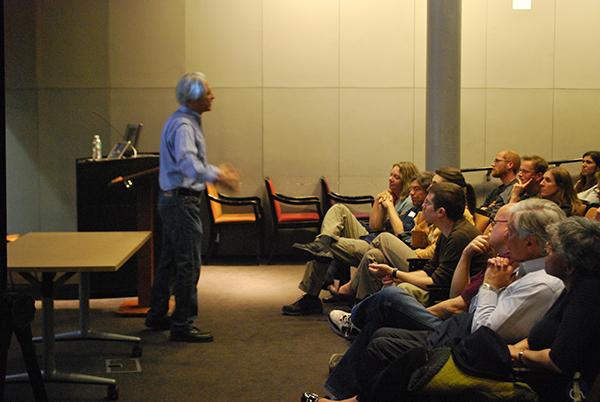Environmental professor tackles future problems
April 23, 2014

While there may not currently be a clear solution to climate change, Dale Jamieson holds out hope for a better future for the environment.
Jamieson, an environmental studies and philosophy professor, told students in a lecture on April 22 that ameliorating global warming is still possible if people shift their morality to focus on the coming generations.
Opening on the history of the struggle against climate change, Jamieson discussed the topic of his new book, “Reason in a Dark Time: Why the Struggle to Stop Climate Change Failed — and What It Means For Our Future.”
Jamieson said climate change is the world’s biggest cooperation problem. He said in order to combat the issue, people need to establish a new moral system that considers the fate of future generations.
To help explain the current responsibility of individuals, Jamieson quoted John Nolt, a professor at the University of Tennessee.
“The average American is responsible through her greenhouse gas emissions [for] the suffering and/or deaths of one or two future people,” Jamieson said.
Jamieson said most people disassociate their actions from future consequences. Jamieson said global climate change calls on people to look out for others.
“The changes that we are beginning to experience may become platforms for new values that will enable us to better navigate life in the densely populated, high-technology, high-consumption world that we have created,” Jamieson’s final slide read.
CAS sophomore Davis Saltonstall agreed that people do not currently feel the need to look out for the future of the planet.
“It’s not until we have a moral shift that is ingrained in everything else that people are going to feel like they have to change their behavior,” Saltonstall said.
Biology professor Tyler Volk said talks about climate change are important for the university’s community.
“It’s very important to have events open to the wider university body with leading experts on sustainability, climate change, environmental futures and more,” Volk said.
Jamieson proposed concrete solutions, including the incorporation of environmental issues into public conversation.
He acknowledged that despite there being no immediate solution, climate change will not wipe out civilization.
“Just because we can’t see how we’re going to get [to a solution] from here doesn’t mean we’re not going to get there,” Jamieson said.
A version of this article appeared in the Wednesday, April 23 print edition. Claire Scimeca is a staff writer. Email her at [email protected].
























































































































































